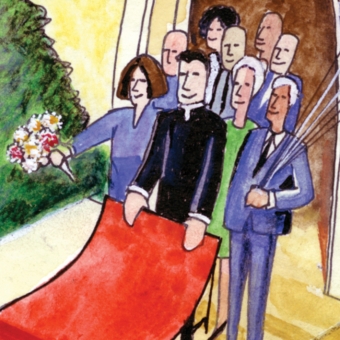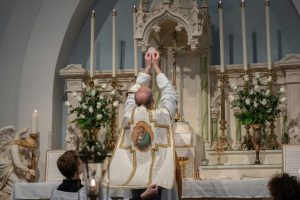On the whole, U.S. Catholic readers sing praises for their parishes.
Sounding Boards are one person’s take on a many-sided subject and do not necessarily reflect the opinions of U.S. Catholic, its editors, or the Claretians.
Compared to most Americans, U.S. Catholic readers are church regulars. While many nationwide surveys point to a decline in church attendance, the majority of online readers and print subscribers who responded to a survey on parish life say that they can be found in their parishes at least twice a week. Even more, nearly a third claim they are churching it up several days a week.
Fifteen percent answered “other” to our question about church attendance, but most of those responses pointed out that we didn’t include an option for those who attend daily Mass in addition to the Sunday liturgy. Only a handful admitted that the frequency of their church attendance is somewhere between seldom and Sundays only.
And who would spend all that time at a place they don’t love? Accordingly, a quarter of readers surveyed gave their parishes high marks-either 9s or 10s-out of a possible 10. To explain their above-average ratings, many of these parishioners said they love how welcoming their parish is and the sense of community they find there.
Alan J. Fredian of Hinsdale, Illinois says that in his parish, “there is a strong feeling of belonging among the people who worship there.” Gerard Beaudette of New Gloucester, Maine says of his parish community, “We are like a tight-knit family.”
Of her Austin, Texas parish, Rhetta Philips says, “We have families who move out of the parish but continue to drive great distances to remain a part of our parish family.”
For some churches, like Chicagoan Jeanie Lewis’ parish, other members really are like blood relatives. “I love that so many of the kids of this parish come back here to raise their kids. Our Catholic school has a large percentage of ‘faith legacy’ kids.”
But while a close-knit community might feel welcoming and inclusive to members heavily involved in parish life, Eleanora Rauschenback’s comment is a sobering reminder of what it can be like to be a less active parishioner. “Sometimes I feel as if I am on the outside looking in,” she says. “I think you need to be active in order to really feel as if you belong.”
Readers who rated their parish a 7, 8, or 9 said it was because there is always room for improvement-no parish is perfect. Nancie Chmielewski of Milwaukee had great things to say about her parish home. It is “a very hospitable community and we have a strong social justice charism; we also are creative with prayer and grounded in a theology consistent with Vatican II.” But she added, “We do need to continue to grow and expand our membership. We are striving for the community to have a self-understanding of parish ownership.”
Chmielewski’s parish isn’t the only one struggling for a communal sense of ownership. Several readers commented on the need for more lay involvement when asked what they would do if pastor for a day. While some expressed concern over wanting to help relieve their pastors of burdensome administrative duties, many expressed the desire for a more democratic approach to decision-making in their churches.
Jerry Bowers in Parma Heights, Ohio thinks his parish council should be elected by parishioners rather than be appointed by the pastor. He says that if he were pastor, he’d welcome “much more input from the people via surveys and polls.”
Frank A. McConville of Wellesley, Massachusetts says his vision of pastoral leadership includes encouraging lay leaders “to initiate and take risks. I’d only hold a veto for things that might get the parish into real trouble.”
Pleased with the work of her pastor in this area, Kathleen Galway of West Chester, Ohio says that if she were in his position, “I’d continue along the current path of openness and inclusion. I’d also surround myself with cooperative staff and then delegate areas of responsibility.”
Dennis Winkesas of Norfolk, Virginia says that if he were pastor of his parish, he’d “make sacramental preparation meaningful and easier for busy parents to participate in rather than setting up a spiritual obstacle course for the people.”
Meaningful preparation for and celebration of the sacraments was a common theme among surveyed readers. For most, a well-prepared liturgy is of the highest importance in terms of what a parish provides its community.
Asked to rate the importance of the things parishes most commonly provide their members, a well-prepared liturgy earned the highest rating, a 4.6 out of 5, followed closely by religious education for children, which earned a 4.5. And parishes seem to be providing these accordingly-80 percent and 79 percent of readers say their parishes are doing a good job in these areas, respectively.
The news isn’t all good, though. Unfortunately, a top parish concern has to do with outreach to youth and young adult Catholics. When asked to rate how well their parishes are serving different groups, young adults received the second-lowest score, a 2.7, with single adults receiving the lowest score, a measly 2.4.
Liz Webster of Rochester, New York complains, “The usual ways are not enticing young adults and the less active to attend Mass, become more involved in parish life, or attend events that would aid them in growing spiritually or in their knowledge of our faith.”
Michael and Linda Flynn of Charlotte, North Carolina want younger Catholics to feel the sense of community so many of our readers claim to have. “We need more for the young adults to keep them coming to Mass and to have a sense of belonging,” they say.
Children and high school youth receive the most attention in parishes, earning a 4.1 and a 3.5 respectively, indicating that what seems to be a problem for a lot of parishes is the sudden drop off in activities and opportunities for their younger parishioners to stay involved in parish life after they’ve been confirmed.
Peggy Duell of Palmerton, Pennsylvania notes that her parish has struggled to keep young parishioners involved after confirmation, but that “attempts to continue [a catechesis program] have failed.” Her conclusion is that “people seem too comfortable in not being involved.”
But Norval Byrd of Pasadena, Maryland suggests that what would improve young adult outreach is “bringing young adults and new families into the leadership roles.”
When asked to dream big and describe their ideal parish, readers’ responses ranged from descriptions of small, intimate communities that provide “crib-to-grave” spiritual support for members to large, ethnically diverse communities that maintain a myriad of support systems for the extended neighborhood.
“My ideal parish would have multiple priests-both men and women,” says Fredrikka Joy Maxwell of Nashville. “It would have parishioners from all over the world and from all walks of life. The parish would be broken down by zip code and people would be nurtured in smaller groups. It might have multiple clusters of house churches small enough for everyone to minister to each other in times of need and in times of joy.”
Kimberly Brooks of Richland, Washington imagines a church that “has Mass twice a day all year long, has bells, uses incense, and has smaller chapels.” Her desire for a parish that provides more opportunities for liturgy and spiritual devotions would also “promote pilgrimages and retreats to regional abbeys.”
Cynthia Trainque of Leominster, Massachusetts says the parish of her dreams would be more committed to providing for the socioeconomic needs of the community. “It would have more social involvement, perhaps a daycare and a medical clinic.” Additionally, she thinks the best kind of parish would be able to “pool money with other churches and even denominations to offer health insurance and purchase fuel in bulk.”
The range of needs and desires for their parishes expresses the great diversity of not just individuals in the church, but of communities as well. Liz Webster of Rochester, New York gets at this when she praises what her parish is doing right. “It is a microcosm of the universal church with all types of views of what being church is and should be about.”
And the survey says…
1. My parish is welcoming, especially to newcomers.
70% – Agree
16% – Disagree
14% – Other
2. I joined my parish:
49% – When I started living within the parish’s geographical boundaries.
22% – After some “shopping around” at other parishes.
10% – As a child. It’s the parish I grew up in.
19% – Other
3. I can be found at my parish:
29% – Several days/evenings. I am involved in and/or volunteer for many of my parish’s offerings.
23% – About twice a week, for Mass and one regular weekly event.
23% – Sundays only, for Mass and occasional socializing afterward.
7% – Most days. I am employed by my parish.
2% – Seldom. I only go for olidays and celebrations such as a baptism or a wedding.
1% – Never.
15% – Other
Representative of “other”:
“I’m there Sunday through Thursday for daily Mass.”
4. Parish leadership welcomes and solicits ideas and input from parishioners.
61% – Agree
32% – Disagree
7% – Other
5. My parish does a good job of providing our community the following:
80% – A well-prepared and celebrated Sunday liturgy.
79% – Religious education for children.
67% – Sacramental formation.
57% – Opportunities for service/outreach.
57% – Social opportunities for members to interact.
57% – Devotional opportunities, such as Eucharistic adoration.
52% – Religious education for adults.
43% – Social justice/advocacy groups.
43% – Retreats/opportunities for spiritual growth.
Results are based on survey responses from 322 U.S. Catholic readers and website visitors. Advance copies of Reader Survey are mailed to a sample of U.S. Catholic subscribers. A representative selection of their comments appears in the magazine.
This article appeared in the June 2010 issue of U.S. Catholic (Vol. 75, No. 6, pages 27-31).
Image: Photo by Tom Wright














Add comment